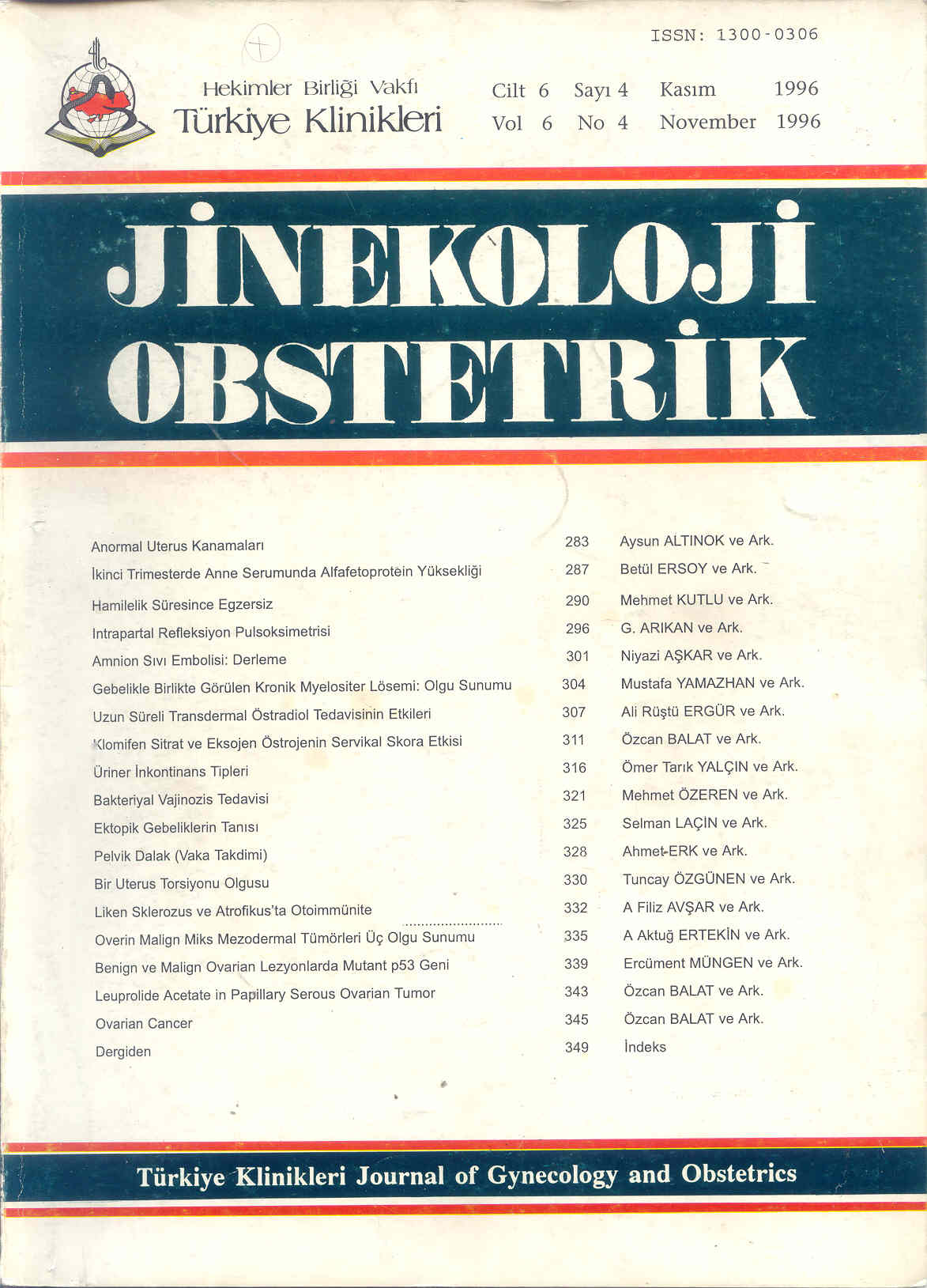Open Access
Peer Reviewed
ARTICLES
3087 Viewed1121 Downloaded
Maternal Serum Creatine Kinase Levels In Ectopic Pregnancies
Ektopik Gebeliklerin Tanısında Maternal Serum Kreatin Kinaz Düzeyleri
Turkiye Klinikleri J Gynecol Obst. 1996;6(4):325-7
Article Language: TR
Copyright Ⓒ 2025 by Türkiye Klinikleri. This is an open access article under the CC BY-NC-ND license (http://creativecommons.org/licenses/by-nc-nd/4.0/)
ÖZET
Amaç: Bu prospektif çalışmada 16 tubal ektopik gebelik vakasında serum kreatin kinaz düzeylerinin tanısal bir belirleyici olarak geçerliliğini araştırdık. Çalışmanın yapıldığı Yer: Dokuz Eylül Üniversitesi Tıp Fakültesi, Kadın Hastalıkları ve Doğum AD, İzmir. Materyel ve Metod. Ektopik gebelik kuşkusu ile kliniğimize başvuran kadınlardan kreatin kinaz ölçümü ile kan alındı. Tanısı histopatolojik olarak doğrulanan hastalar çalışmaya dahil edildi. Ölçülen değerler ilk trimester sağlıklı gebelikleri ve abortus imminens vakalarıyla karşılaştırıldı. İstatistiksel analiz için "Student t test" kullanıldı. Bulgular: Kreatin kinaz düzeyleri tüm tubal ektopik gebelik vakalarında 40 IÜ/L'den yüksekti ve bu değer hem abortus imminens hem de sağlıklı gebeliklerdekinden istatistiksel anlamlı olarak yüksekti (p< 0.0001). Sonuç: Bu çalışmada, serum kreatin kinaz düzeylerinin ektopik gebelik kuşkulu hastalarda tanıya yardımcı bir test olarak kullanılabileceği sonucuna vardık.
Amaç: Bu prospektif çalışmada 16 tubal ektopik gebelik vakasında serum kreatin kinaz düzeylerinin tanısal bir belirleyici olarak geçerliliğini araştırdık. Çalışmanın yapıldığı Yer: Dokuz Eylül Üniversitesi Tıp Fakültesi, Kadın Hastalıkları ve Doğum AD, İzmir. Materyel ve Metod. Ektopik gebelik kuşkusu ile kliniğimize başvuran kadınlardan kreatin kinaz ölçümü ile kan alındı. Tanısı histopatolojik olarak doğrulanan hastalar çalışmaya dahil edildi. Ölçülen değerler ilk trimester sağlıklı gebelikleri ve abortus imminens vakalarıyla karşılaştırıldı. İstatistiksel analiz için "Student t test" kullanıldı. Bulgular: Kreatin kinaz düzeyleri tüm tubal ektopik gebelik vakalarında 40 IÜ/L'den yüksekti ve bu değer hem abortus imminens hem de sağlıklı gebeliklerdekinden istatistiksel anlamlı olarak yüksekti (p< 0.0001). Sonuç: Bu çalışmada, serum kreatin kinaz düzeylerinin ektopik gebelik kuşkulu hastalarda tanıya yardımcı bir test olarak kullanılabileceği sonucuna vardık.
ANAHTAR KELİMELER: Ektopik gebelik, kreatin kinaz
ABSTRACT
Objective: In this study, we prospectively searched the validity of serum creatine kinase levels as a diagnostic marker in 16 tubal ectopic pregnancies. Institution: Dokuz Eylül University School of Medicine, Department of Obstetrics and Gynecology. Material and Methods: We took blood samples from the patients who admitted to our clinic with suspected ectopic pregnancies. At the end of the study, the patients whose diagnosis confirmed histopathologicaly were evaluted. Measured values were compared with the values in spontaneous abortions and normal pregnancies of the first trimester. Student test was used for statisticle analysis. Results: Creatine kinase level was >40 IU/L in all ectopic pregnant patients and significantly higher than the levels of patients in both other groups (p< 0.0001). Conclusion: Here we report that serum creatine kinase levels can be used as a possible diagnostic marker in patients with suspected ectopic pregnancies.
Objective: In this study, we prospectively searched the validity of serum creatine kinase levels as a diagnostic marker in 16 tubal ectopic pregnancies. Institution: Dokuz Eylül University School of Medicine, Department of Obstetrics and Gynecology. Material and Methods: We took blood samples from the patients who admitted to our clinic with suspected ectopic pregnancies. At the end of the study, the patients whose diagnosis confirmed histopathologicaly were evaluted. Measured values were compared with the values in spontaneous abortions and normal pregnancies of the first trimester. Student test was used for statisticle analysis. Results: Creatine kinase level was >40 IU/L in all ectopic pregnant patients and significantly higher than the levels of patients in both other groups (p< 0.0001). Conclusion: Here we report that serum creatine kinase levels can be used as a possible diagnostic marker in patients with suspected ectopic pregnancies.
MENU
POPULAR ARTICLES
MOST DOWNLOADED ARTICLES





This journal is licensed under a Creative Commons Attribution-NonCommercial-NoDerivatives 4.0 International License.










